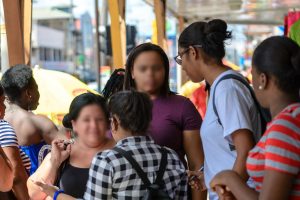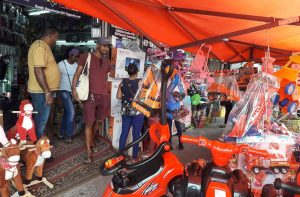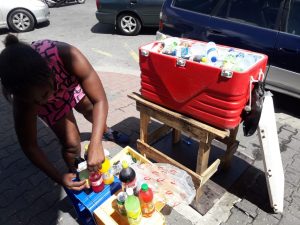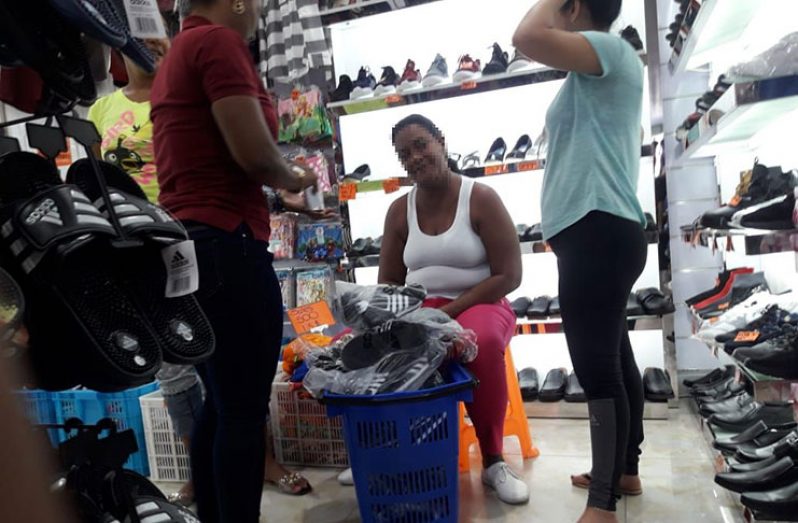– businesses must adapt to stay profitable
– “¡ZAPATOS! … ¡ZAPATOS MAS!” (Shoes! More Shoes!)
FOR someone with basic knowledge of Spanish, the words above would be easily recognised. However, in a general way, conversation between local sales girls and Cubans in a typical store would pass by like a blur.
On Saturdays, ‘Lucky Star’, the large grey store on Wellington Street, is filled with persons from the Spanish-speaking Caribbean country, Cuba. The store — which is your average local wholesale apparel store — is owned and managed by Chinese nationals. Guyanese sales girls and a few male porters are also employees.
On the front of the building, there is a sign inviting females desirous of working as sales girls, to apply within. The female Chinese manager (no name given) told the Guyana Chronicle that, to be eligible for employment, one needs to know “a little Spanish.”
The average customer would be amazed at the manner in which the sales girls and the Cubans communicate in Spanish. The ability of the sales girls to revert to English Language to meet the needs of local customers would also fascinate an on-looker. It is reasonable to assume that the general communication would require more than ‘a little spanish’.

“[The Cubans] are creating income on a whole; that’s the bottomline,” local economist Dr. Thomas Singh told the Guyana Chronicle. “The Cubans come here with purchasing power and they create income.”
Dr. Singh explained that within the country — along the commercial hub of Regent Street particularly — many Cubans can be seen shopping. He added that, to attract these customers who are in Guyana with “purchasing power”, businesses would need to make necessary adaptations.
“Definitely, [Spanish-speaking] is an effect. The salesgirls are now bilingual,” Singh said. He explained further that such was, perhaps, to create a ‘safety valve’ for the Cuban customers; it allows them to feel more comfortable doing business.
Commenting on the more visible mechanisms of transformation adopted by businesses, Singh also related: “I was surprised walking into a store called Little Havana [Havana is the capital city of Cuba] but it was just another Chinese store.”

Ciudad de Cuba (Cuba City/ City of Cuba) is another Chinese-owned apparel store, located on Regent Street. Previously, the store’s name was in Chinese but, as part of the measures taken to attract Cubans, the name was changed about one year ago.
The owner declined to speak with this newspaper, but granted permission for a sales girl to speak on his behalf. The sales girl was not Guyanese. She was a Venezuelan who was proficient in English
The salesgirl, Delis (only name given) had only been working at the store for about three weeks, but affirmed that much more Cubans purchased from the store than from few of the surrounding stores. She also highlighted that she was the one who would engage the Cubans when they visited the store.
Economist Singh, in an invited comment, said “I think Regent Street is becoming a more cosmopolitan place than it used to be,” He added that the great influx of Cubans was most recent. There were also Venezuelans, Brazilians, and Indian and Chinese nationals, most of whom have largely integrated themselves into the commercial sphere

BUSINESS
“The purchasing power of the Cubans has a multiplier effect,” Dr. Singh said.
In economics, the multiplier effect– in simple terms– is an increase in spending which produces an increase in the national income and consumption greater than the initial amount spent.
“I don’t know to what extent the purchasing/spending power is distributed to the local, Guyanese-run businesses versus the Chinese stores on Regent street,” Singh noted, but explained: “But if it is the Chinese store, it might not be that they are doing or offering anything different.. It might just be that the Cubans are coming here because the Chinese stores are offering low-priced, decent quality on quite a variety of things.”
Even if that is the case — where Chinese-owned businesses are able to garner more of the Cubans’ business — that still benefits the local economy through the multiplier effect, according to the economist.
“The Chinese are employing sales girls and porters where the money still goes,” he said.
If the store owners have an increase in sales, they may be able to employ more persons who have individual spending power and would spend in different ways, to create income for other persons.
“It might be small on an individual basis, but aggregated, the spending effect aggregated across individuals and on the cross rounds of spending, it has both the multiplier effect of spending in successive rounds,” the economist said.
Take for example, a salesgirl is hired. She travels by minibus to and from work- that allows money to be channelled there. If she does some construction in her home, she hires a mason and money is channelled there as well.
Within the accommodation sector however, it is evident that locally owned businesses have been able to capitalise. A number of buildings that were once rented as store or office spaces have been converted to living spaces. These buildings are owned by Guyanese.
On Robb Street, one woman (who declined to give her name) explained that she had converted the office space into rooms to rent to Cubans. Instead of charging a fixed sum per room, she had been charging per occupant. It costs about $50- $70 US to rent a room for one night, but, cognisant that this price may be too steep for the visitors, the woman instead charges about $25- $40 US per person and fits up to four Cubans in a room.
However, she explained that it was becoming increasingly competitive in the accommodation sector and, as such, it was compulsory for her to ‘up her ante.’ “Now, we have to offer transportation services for the Cubans and ensure we have food for them to purchase as well,” the woman said.

Director of the Guyana Tourism Authority, (GTA) Brian Mullis, recently told the Guyana Chronicle that it was estimated that the typical visitor from Cuba stayed four to six days and spent US$2,000 to US$3,000 per visit on purchases, lodging, food and other necessities.
Aggregated, the money spent by the Cubans alone totals about US$85M, which contributes to Guyana’s Gross Domestic Product (GDP), according to Mullis.
However, there are other variables to consider. The spending behaviour of a Chinese business owner might be different from that of a local business owner, according to the economist.
Singh said, “…the distributive effect depends on where the spending is occurring.” He suggested that a comprehensive study could provide more insight and would allow for a greater understanding on how income is really generated for locals.
In the absence of that study, there are other factors to look at that can ascertain the negative implications of the adapted business culture.
The Bank of Guyana, in recent times, highlighted that some commercial businesses were transacting business in US currency and such practice could cause Guyana to lose foreign exchange entering the official market.
For three consecutive Saturdays, this newspaper covertly observed business transactions done at one local wholesale store between Cubans and the store’s cashiers. It was noticed that the Cubans bought items in large quantities, and paid for them, mainly, with U.S currency. In fact, the store, under surveillance, even displayed the prices for items in both local and US currencies. Such was indeed a contravention.
“The Bank of Guyana notes with concern that some businesses are accepting foreign currency for the purpose of settling payments for transactions, instead of Guyana dollars…. The bank wishes to advise that pursuant to section (20) of the Bank of Guyana Act, 1998, all monetary obligations or transactions in Guyana shall be settled in Guyana dollars,” a notice from the bank read.
Furthermore, the notice highlighted that only banks and licensed cambios were authorised to conduct buying and selling of foreign currency and that the Bank of Guyana Act 1998 and the Dealers in Foreign Currency (Licensing) Act 1989, provide penalties for violations which include fines and imprisonment.
Speaking to the Guyana Chronicle, Governor of the Bank of Guyana Dr. Gobind Ganga, said that such practices, as observed between the Cubans and the store owner, made it difficult to trace the foreign currency spent in the country.
Dr Singh however said, “This [buying and selling in foreign currency] is perhaps done to ensure that perhaps the spending power the Cubans bring is not lost to the middle person- which is the foreign exchange dealer.” He also cited security concerns, and said that perhaps the local businesses are just trying to make the foreigners more comfortable when conducting business.
President of the Georgetown Chamber of Commerce and Industry (GCCI), Deodat Indar, had also related to this newspaper that while he could not speak to those businesses breaking the law, making the conduct of commerce difficult, by enforcing the regulations, would be counter-productive.
The GCCI president further opined that there must be no hindrance to commerce here, as businesses, in the hospitality sector, interact, on a daily basis, with foreigners and would receive money in foreign currency.

One Cuban women, Margarita Gomez, was shopping along Regent Street during the Christmas season. She was here for just one week, and was purchasing clothing, in large quantities, to take back to her country. She stated. that she preferred to shop at the Chinese stores, because she was able to get better prices for the items she purchased. She added that “At the Guyanese stores, I would have to bargain with them for good prices.”
This preference by the Cubans fuels a sense of xenophobia among the local business owners.
XENOPHOBIA
The proprietor of the Payless, Get More Shopping Centre on Regent Street, Mr. Harry, has attempted to capitalise on the purchasing power of the Cubans, but has experienced some challenges to this.
He related that he had hired two sales girls who were fluent in Spanish, as part of his efforts to facilitate business but that has not helped much.
“They not buying, they just not buying,” he complained. “They used to come before and buy all kinds of things, mostly clothing and footwear, but now they don’t come as often as they used to before. They does buy from the Chinese stores now.”

Other local business persons, like Mr. Harry, are making attempts to adapt, so that they too can capitalise on the influx of Cubans.
– “No eres Cubano. No es posible.”
This Cuban woman in about her mid-30s, declined to speak- other than to say: “You are not Cuban. It is not possible.”
Her reasons were apparent; apart from the evident language barrier, the Cubans have received some amount of hostility from locals.
“The Chinese are offering products and services at prices that the average person can really use,” Dr. Singh said. He further explained that the Chinese had not only been able to offer good prices, but they also offered a “package of goods and services” that really appeal to the Cubans.
This “package” is perhaps something that is not yet fully mastered by many local businesses, and, their inability to adapt in this manner could be a factor that affects business.
Dr Singh further added that “I would hope that, looking ahead, that the xenophobia doesn’t get worse; instead, we look at this opportunity provided by the foreigners in Guyana to become a more open, cosmopolitan society. For example, we can offer restaurant services with a greater variety; we can begin to learn about the cultures of other countries; I would hope that in schools we begin to- deliberating- have our students learn about other people,”
– ¡Agua! (Water!)

The midday sun ‘was beating down’ and Charlene (not real name) shouted one of the few spanish words she knew- agua- in a feeble attempt to persuade the Cubans passing to purchase a cold beverage from her small stand, at the corner of Robb and Wellington streets.
“If I tell you… If you not spanish, they not buying from you, you know,” she explained a bit frustrated. “And they don’t like spend- they prefer to walk the whole town with them big big bags than to tek a taxi.”



.jpg)











